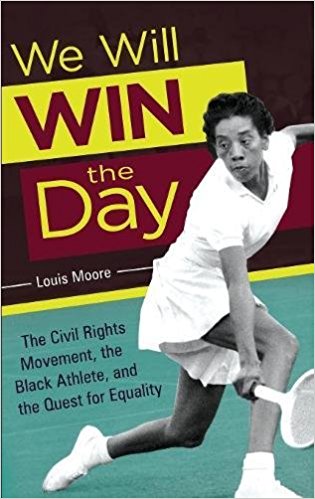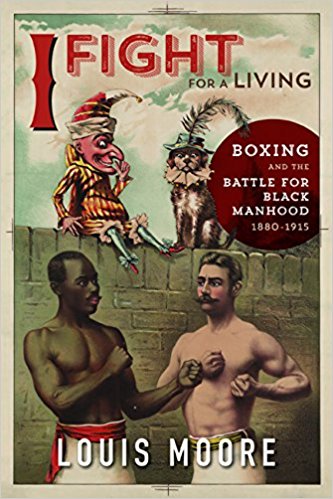 This week at In The Past Lane, the history podcast, we look at the complicated history of black athletes in US history. I’ll speak with historian Louis Moore, author of two new books on African American athletes, I Fight for a Living: Boxing and the Battle for Black Manhood, 1880-1915 (University of Illinois Press), and We Will Win The Day: The Civil Rights Movement, The Black Athlete, And The Quest For Equality (Praeger). In the first half of our conversation, we discuss the emergence of black boxers in the late nineteenth century. These men overcame poverty and racism to compete in the ring with fellow African Americans, but also white Americans. For black boxers, success in the ring earned them financial success and the opportunity to engage in a vibrant “sporting” culture. Their success also symbolized the African American quest for respect and equal rights. The most famous of these men was Jack Johnson who became heavy weight champion in 1908. His success, and his flashy lifestyle, in an age when Jim Crow was being imposed across the nation infuriated many white Americans. When no white boxer could defeat Johnson in the ring, federal authorities used the legal system to end his career. In the second half of our chat, Louis Moore walks us through the long history of African American athletes and the Civil Rights movement. He talks about the well-known incidents like John Carlos and Tommy Smith raising their fists in the Black Power salute at the 1968 Olympics, as well as many protests by people lost to history. Suffice it to say that Colin Kaepernick’s decision to kneel during the National Anthem is part of a long tradition of black athletes and protest.
This week at In The Past Lane, the history podcast, we look at the complicated history of black athletes in US history. I’ll speak with historian Louis Moore, author of two new books on African American athletes, I Fight for a Living: Boxing and the Battle for Black Manhood, 1880-1915 (University of Illinois Press), and We Will Win The Day: The Civil Rights Movement, The Black Athlete, And The Quest For Equality (Praeger). In the first half of our conversation, we discuss the emergence of black boxers in the late nineteenth century. These men overcame poverty and racism to compete in the ring with fellow African Americans, but also white Americans. For black boxers, success in the ring earned them financial success and the opportunity to engage in a vibrant “sporting” culture. Their success also symbolized the African American quest for respect and equal rights. The most famous of these men was Jack Johnson who became heavy weight champion in 1908. His success, and his flashy lifestyle, in an age when Jim Crow was being imposed across the nation infuriated many white Americans. When no white boxer could defeat Johnson in the ring, federal authorities used the legal system to end his career. In the second half of our chat, Louis Moore walks us through the long history of African American athletes and the Civil Rights movement. He talks about the well-known incidents like John Carlos and Tommy Smith raising their fists in the Black Power salute at the 1968 Olympics, as well as many protests by people lost to history. Suffice it to say that Colin Kaepernick’s decision to kneel during the National Anthem is part of a long tradition of black athletes and protest.
 Among the many things discussed in this episode:
Among the many things discussed in this episode:
The emergence of African American boxers in the 19th century.
How middle-class African Americans initially opposed black boxers but gradually came to embrace them as symbols of achievement.
Why interracial boxing matches in the early 20th century, in large measure due to the dominance of black boxers over white opponents, were outlawed.
How African American athletes were purged from many sports in the Jim Crow era.
The rise and fall of the great African American boxer, Jack Johnson.
Why riots broke out across the US when African American boxer Jack Johnson defeated Jim Jeffries in 1910.
The long tradition of African American athletes using sports and protest to further Civil Rights.
How protests and boycotts by the black community in cities like Washington, DC and New Orleans forced NFL franchises to bring on black players.
How the NFL required cities like Atlanta, Houston, and New Orleans to desegregate before awarding them a football franchise.
Where Colin Kaepernick fits into the history of protest by African American athletes.
More about Louis Moore – website
Recommended reading:
 Louis Moore, I Fight for a Living: Boxing and the Battle for Black Manhood, 1880-1915 (University of Illinois Press).
Louis Moore, I Fight for a Living: Boxing and the Battle for Black Manhood, 1880-1915 (University of Illinois Press).
Louis Moore, We Will Win The Day: The Civil Rights Movement, The Black Athlete, And The Quest For Equality (Praeger).
Amy Bass, Not the Triumph But the Struggle: 1968 Olympics and the Making of the Black Athlete (2002).
Harry Edwards, The Revolt of the Black Athlete (2017)
Douglas Hartmann, Race, Culture, and the Revolt of the Black Athlete: The 1968 Olympic Protests and Their Aftermath (2004)
William C. Rhoden, Forty Million Dollar Slaves: The Rise, Fall, and Redemption of the Black Athlete (2006).
Geoffrey C. Ward, Unforgivable Blackness: The Rise and Fall of Jack Johnson (2004)
Music for This Episode
Jay Graham, ITPL Intro (JayGMusic.com)
Kevin McCleod, “Impact Moderato” (Free Music Archive)
Ketsa, “Escape the Profane” (Free Music Archive)
Andy G. Cohen, “A Human Being” (Free Music Archive)
Jon Luc Hefferman, “Winter Trek” (Free Music Archive)
The Bell, “I Am History” (Free Music Archive)
Production Credits
Executive Producer: Lulu Spencer
Technical Advisors: Holly Hunt and Jesse Anderson
Podcasting Consultant: Darrell Darnell of Pro Podcast Solutions
Photographer: John Buckingham
Graphic Designer: Maggie Cellucci
Website by: ERI Design
Legal services: Tippecanoe and Tyler Too
Social Media management: The Pony Express
Risk Assessment: Little Big Horn Associates
Growth strategies: 54 40 or Fight
© In The Past Lane, 2018
